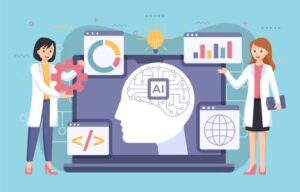Before I start, a few caveats. First, I really don’t know very much about AI. Also, I’m only really talking here about ChatGPT. And I’m only talking about the world of commercial content, not creative writing.
I start with all that because pretty much everyone I know who is a creative type is violently against AI in all its forms. I get all that. But I also work in the very commercial world of marketing for brands and businesses. It’s not a very glamorous place, but it’s where many aspiring writers go for the bread-and-butter work that funds their creative dreams. And over there, nobody has any qualms about using AI tools at all.
Let me give you a couple of recent examples:
• A client asks me to write an ebook based on a webinar about IT security they’ve recently delivered. They provide a version of the eBook done by ChatGPT with the expectation I will simply edit that. I listen to the full webinar out of curiosity. The AI version is well structured and covers all the key points. It misses out a few things I now add in, notably anecdotes and examples that help bring a rather dry topic to life. But it has basically done a good initial job.
• Another client asks me to write a series of blog posts to promote their digital marketing agency. As I know this client is very AI-friendly, I put this request to ChatGPT with a brief explanation of context, topics and audience. Back come a dozen ideas, most very relevant. I sort through them, tweak the ones I like and add a few more of my own (though many of the ones I’d have come up are already there). The client loves the ideas and commissions four on the spot.
• Again, out of curiosity, I ask ChatGPT to draft the blog posts for me. The results are frankly incredible. In about 5 seconds, I have four crisply professional, well-informed pieces. I sense-check the content, adding my own thoughts, making some small tweaks for tone and structure. Each post has taken 20-30 minutes to complete rather than 2-3 hours.
Now some may deplore the above, but the genie is out of the bottle and brute economics will mean this kind of practice will become completely standard in the world of commercial content, if it hasn’t already. And the simple fact for someone like me is that, if I don’t take this kind of work, someone else will.
Let’s not forget we are talking about content here, not literature. Since the founding of Google, billions and billions of words have been produced simply to target certain keywords in a bid to help businesses improve their search rankings. (I know, I wrote 1000s of them myself.) Typically, a content person might be asked to write an article on a topic they knew nothing about – ‘migrating your business to the cloud’ or ‘first-time mortgage buyer’s guide’, perhaps. So they’d simply google a handful of other pieces on the same topic, and stitch together their own version. ChatGPT basically does the same thing, only much faster and often smarter.
I know many people who use AI in their work all the time. They use it to summarise 40- page business pitches into one-page overviews or draft job descriptions that would otherwise take hours to produce. Then they add the human layer. Where we are using AI in this way, as a tool rather than a replacement for human creativity I don’t really have an issue. I can’t afford to. AI is here to stay and as writers we need to make our peace with that and pick our battles. Lots of AI applications are really souped-up tools that make certain grunty jobs easier for humans.
As a creative type I am against the theft of ideas and I don’t want to see anybody lose out on an opportunity to make money from their creative work. But commercial content is not art, and there is still a role for the writer if we are prepared to embrace it.
BIO – Dan Brotzel’s latest novel is Thank You For The Days
Hmm, Dan. I recently asked the AI that comes up on iPhone Safari to give me a list of nocturnal herbivorous birds. It provided one answer: pygmy owls. [bleeper buzzer] Wrong!
If people use AI, they need to doublecheck all answers. GIGO (garbage in, garbage out). If someone on the internet says something is true, artificial intelligence hasn’t learned to filter out the garbage.
Oh — and recent endeavors show that AI has learned to lie.
At this point, I see folks fighting against AI. Or grudgingly saying it’s OK for commercial writing but not “real” writing. The problem with this attitude is it’s out of step with what I see actually happening in the marketplace.
I know lots of professional writers who have begun using AI for all sorts of projects — commercial writing, sure, but also feature articles, columns, scripts, and fiction. They’ll often have AI write a first draft or part of a passage and then rework it. None of them talk about this publicly because there’s no upside to talking about it publicly.
I don’t understand why you don’t collectively care more about the environmental impacts of using ChatGPT. 10x the energy use of regular search and that’s not even taking into account the vast water use needed to cool the servers— potable, filtered water, because anything else would wreck the hardware. That you would tell other people to just get over it and seems very shortsighted to say the least.
There are a lot of concerns about AI, from environmental issues to privacy to job displacement to misinformation. That said, this is a site for freelance writers, so it makes sense that articles here would primarily focus on how AI affects writers, rather than the more general issues with AI.